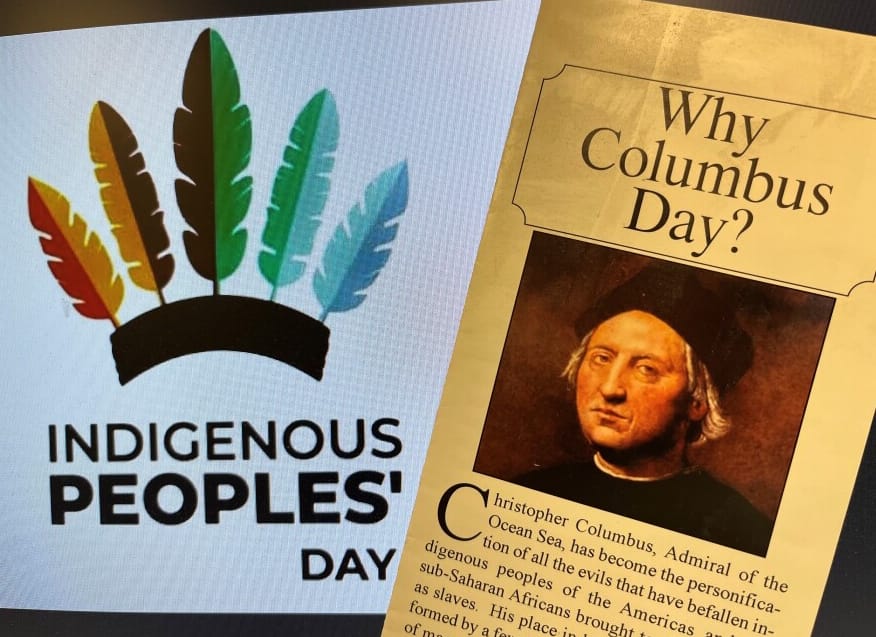Indigenous Peoples' Day, Columbus Day strike tenuous bond but tension still remain
Two holidays at odds with each other nevertheless share the same day

Is the second Monday in October observed as Columbus Day? Or Indigenous Peoples’ Day?
Like everything else these days, the answer is partisan.
It all depends on who happens to be the U.S. president or your state governor.
Columbus Day commemorates the arrival of Italian explorer Christopher Columbus in the Americas in 1492. Columbus Day was proclaimed a national holiday in 1934 and established as a permanent federal holiday in 1971.
In 1492, Christopher Columbus landed on an island in the Caribbean, believing it to be the East Indies. Therefore, the term "Indian" was mistakenly applied to Native Americans. Columbus never set foot on Turtle Island, the name the indigenous people used for the North American mainland. Columbus's arrival marked the beginning of European colonization in the New World, with devastating impacts on indigenous populations, their languages, and ways of life.
Indigenous Peoples' Day has its roots in a 1977 United Nations conference and began to gain traction in the late 1980s, with South Dakota being the first state to officially recognize it in 1990. Indigenous Peoples' Day has been increasingly adopted alongside Columbus Day to honor Native American culture and history. Others observe one or the other but not both.
A proclamation issued recently by President Donald Trump describes Columbus as “the original American hero, a giant of Western civilization, and one of the most gallant and visionary men to ever walk the face of the earth,” and goes on to claim he has been slandered in an “attack on our heritage.” Trump refuses to recognize Indigenous Peoples' Day.




Bottom right: A Wausau Pow Wow
Appleton resident Renee Gralewicz, a descendant of the Stockbridge-Munsee Community and enrolled in Brothertown, says it is the indigenous community’s heritage that has too long been ignored.
“‘Indigenous Peoples’ Day is a national recognition of our heritages and contributions to the United States,” she asserts. “It’s also a recognition that we’re still here, flourishing. Despite the government’s intention of genocide, the U.S. is still in an obligatory relationship with us. Indigenous Peoples Day also reflects the history that Columbus never set foot on or saw Turtle Island, also known as North America.”
In 2021, former President Joe Biden was the first president to formally recognize Indigenous Peoples' Day. He issued two separate proclamations: one for Columbus Day, which focused on the contributions of Italian Americans, and another for Indigenous Peoples' Day, which recognized the "resilience, strength, and perseverance" of Indigenous peoples and their contributions, even in the face of "violence and devastation".
Wisconsin began formally observing Indigenous Peoples' Day when Governor Tony Evers signed an Executive Order on October 8, 2019, recognizing Native Nations, their cultures, histories, and sovereignty. The executive order made Wisconsin one of the first states to officially establish Indigenous Peoples' Day, replacing Columbus Day in state recognition. Evers recently issued a proclamation recognizing October 13, 2025, as Indigenous Peoples' Day.
“Every year on this day, we celebrate the generations of resilient Tribal communities, rich cultures, languages, and traditions that have formed deep roots here since long before Wisconsin became a state,” Evers said. “So, today, I invite you to join me in honoring our Native Nations and the immense contribution Indigenous people have made to our state.”
Native Americans campaigned for years for local and national days of recognition. At least 20 states and the District of Columbia now observe Native American or Indigenous Peoples’ Day, in place of or in addition to Columbus Day. Whether it will be observed federally or in Wisconsin will depend on the next president and governor.
Tribal Histories, a PBS Wisconsin series of half-hour programs, presents the stories of all eleven federally recognized American Indian tribes and bands located in Wisconsin, plus one tribe, Brothertown, that is seeking to regain its federal recognition. This documentary series was the culmination of the First Nations' efforts to tell their own stories in their own voices to non-Native audiences.
In order of production:
Ojibwe History
Potawatomi History
Menominee History
Oneida History
Stockbridge-Munsee Mohican History
Bad River Ojibwe History
Ho-Chunk History
Red Cliff Ojibwe History
Lac du Flambeau Ojibwe History
Brothertown History
Lac Courte Oreilles Ojibwe History
Mole Lake Ojibwe History
St. Croix History






